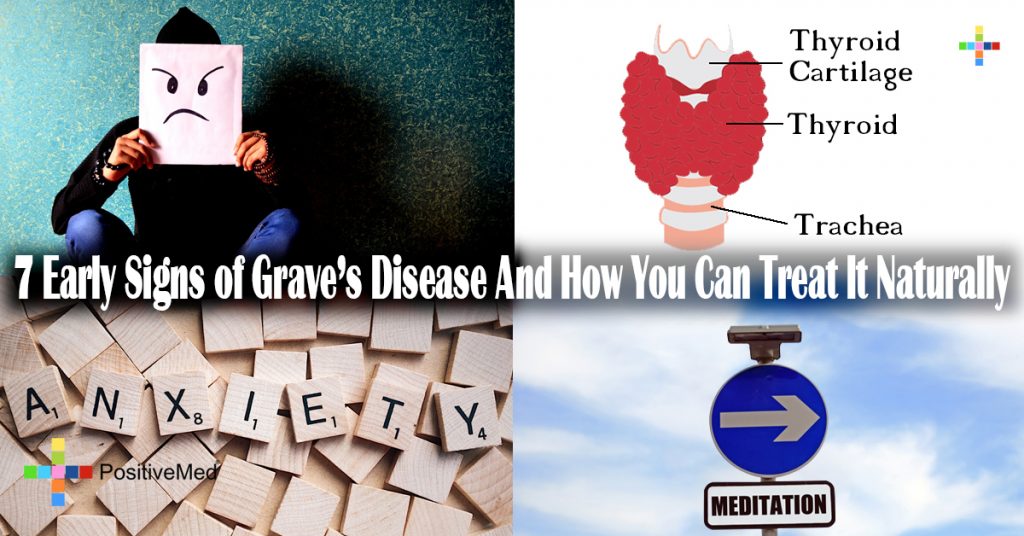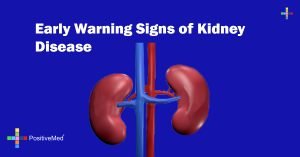
Graves’ disease affects the immune system to create excessive amounts of thyroid hormones. It can affect everyone, but it is typically found in women under the age of 40. Mayo Clinic states that the cause of Graves’ disease is still unknown as of 2015, but researchers are sure that the body creates an antibody in the thyroid gland that takes over normal production when a person has Graves’ disease. Graves’ disease is often related to hyperthyroidism, but hyperthyroidism can also occur in other instances.
Graves’ ophthalmopathy, a derivative of Graves’ disease that causes inflammation of tissue and muscles around the eyes, affects close to 30 percent of individuals with Graves’ disease. Graves’ dermopathy is a very rare condition related to Graves’ disease that causes carbohydrates to build up in the skin.
Symptoms
The seven early warning signs of Graves’ disease include:
– Thyroid gland enlargement
– Anxiety
– Irritability
– Reduced $ex drive or erectile dysfunction
– Heat sensitivity/ increased perspiration
– Tremors in the hands and fingers
– Abnormal menstrual cycles
Other Graves’ disease symptoms include weight loss, altered heartbeat and an increased amount of bowel movements.
Graves’ ophthalmopathy symptoms include:
– Bulging eyes
– Vision loss
– Inflamed or reddened eyes
– Pain or pressure in eyes
– Sensitivity to light
– Gritty sensation in eyes
– Double vision
Red, swollen skin on the tops of feet and shins is the indicator of Graves’ dermopathy.
RELATED ARTICLE: See How Coconut Oil Is Beneficial For Your Thyroid Health
Complications of Graves’ Disease
A thyroid storm is a rare complication of Graves’ disease, but it is life-threatening. If Graves’ disease is left untreated, it can cause this condition also known as thyrotoxic crisis or accelerated hyperthyroidism. Symptoms of this condition include delirium, fever, vomiting, jaundice, low blood pressure, and coma. Graves’ disease can also cause maternal heart failure, miscarriage, high blood pressure and poor fetal growth in pregnant women. Heart disorders and osteoporosis are also complications of untreated Graves’ disease.
Natural Treatments
Stress is a trigger of Graves’ disease. Since stress reduces the production of white blood cells, it alters the autoimmune system and causes it to malfunction. Stress reduction methods such as meditation, yoga or tai chi can align the autoimmune system and reduce Graves’ disease episodes. Getting proper rest to allow the body to heal also goes a long way in regulating Graves’ disease, and allowing the immune cells to benefit from laughter can also reduce symptoms.
Limit iodine intake to less than 150 mcg daily and eat foods such as peanuts, fresh broccoli, almonds, cauliflower, and cabbage to help block iodine absorption. Avoid foods such as sugar, wheat, aspartame, dairy, and saturated fats, and WebMD suggests using iodized table salt when taking in the necessary salt amount that is actually healthy for the thyroid. Take vitamins A, B1, B2, B6, C, D, E along with copper and essential fatty acids supplements. Herbal medicines such as Lycopus virginicus, Leonurus, lemon balms and Skullcap in tincture or tonic form are also effective. Including homeopathic tincture preparations such as Coffea, Kelpasan, Thyroidinum, and Nature muriatic with dietary changes and symptom reduction methods can successfully keep Graves’ disease in remission and reduce symptoms.
Graves’ Disease does not have to be life-threatening, and many times natural treatments and lifestyle changes can reduce the severity of symptoms. Be sure to consult your doctor about any choices you may to ensure long-lasting health with no complications.





